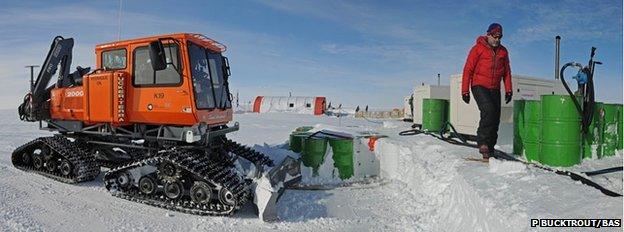Lake Ellsworth Antarctic drilling project called off
- Published

The team burned much of its fuel in a bid to connect the under-ice boreholes
An ambitious mission to drill through 3km (1.8 miles) of Antarctic ice to a lake that has been sealed off for thousands of years has been cut short.
The team at Lake Ellsworth decided to call off the mission, external in the early hours of Christmas Day UK time.
They were unable to join the main borehole with a parallel hole that was to be used to recover drilling water.
The team is now "weatherising" the equipment and it is unclear when they will be able to resume the project.
The £8m ($13m) project, headed by the British Antarctic Survey (Bas), aimed to drill carefully down using near-boiling water to pierce the lake, which has been untouched for as much as half a million years.
The hope had been to find hints of simple life forms existing in the extreme conditions of pressure and temperature, and to find a record of climate in the lake's sediments.
The programme ran into trouble last week as the main boiler used to heat drilling water broke down, with a replacement part being flown from the UK reaching the remote site last Friday.
With the boiler working, the team aimed to make two parallel boreholes, intended to join 300m below the surface.
A first borehole was drilled and left for 12 hours to create a hot-water cavity. This was to be used to re-circulate drilling water and to balance pressures when the sequestered lake was finally breached.
However, the team were unable to reach the cavity during the course of drilling the second, main borehole.
"We kept trying for over 24 hours to reach that connection but we couldn't do it," said principal investigator of the project Martin Siegert, from the University of Bristol.
"All that time we were losing fuel and water from the ice sheet surface and we got to a critical condition where our calculations showed us we simply didn't have enough fuel to continue any further down into the ice sheet to hit the top of the lake," he told BBC News.
The team is now starting the long process of gathering up its equipment for eventual return to the UK, where it will be serviced.
Once back on UK soil, the team will have to develop a report on what went wrong, and only then can the thought of a return trip be considered.
"It will take a season or two to get all of our equipment out of Antarctica and back to the UK, so at a minimum we're looking at three to four, maybe five years I would have thought," Prof Siegert said.
But he remained hopeful about the future, and said that this year's mission was far from a complete loss.
"We still want to do that testing, they were compelling scientific drivers a few years ago and they remain so. It's very important that we take stock of what we achieved here," he said.
Given the long time that it may take to fund and mount another mission to Ellsworth, it may be that other nations aim for other sealed-off Antarctic lakes in the nearer term.
"We have never depicted it as a race, but it may well happen that others get there first," Audrey Stevens, Bas spokesperson, told BBC News.
- Published19 December 2012
- Published21 December 2012
- Published17 December 2012
- Published13 December 2012